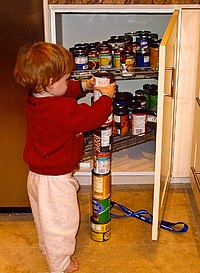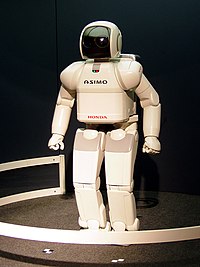
Social Robots and Young Children’s Early Language and Literacy Learning
Sign Up to like & getrecommendations! Published in 2019 at "Early Childhood Education Journal"
DOI: 10.1007/s10643-019-00997-7
Abstract: Due to recent advances in technology, social robots are emerging as educational tools with the potential to enhance early language and literacy skills in young children. Social robots are defined as machines that can socially… read more here.
Keywords: literacy learning; early language; literacy; language literacy ... See more keywords

The effect of facial features on facial anthropomorphic trustworthiness in social robots.
Sign Up to like & getrecommendations! Published in 2021 at "Applied ergonomics"
DOI: 10.1016/j.apergo.2021.103420
Abstract: As the nature of human-robot relationships have become increasingly bound to shift from supervisor-machine to friend-companion, people have exhibited an increasing interest in making social judgments toward such anthropomorphic objects, such as trustworthiness. However, the… read more here.
Keywords: anthropomorphic trustworthiness; facial features; trustworthiness; effect ... See more keywords

Improving therapeutic outcomes in autism spectrum disorders: Enhancing social communication and sensory processing through the use of interactive robots.
Sign Up to like & getrecommendations! Published in 2017 at "Journal of psychiatric research"
DOI: 10.1016/j.jpsychires.2017.02.004
Abstract: For children with autism spectrum disorders (ASDs), social robots are increasingly utilized as therapeutic tools in order to enhance social skills and communication. Robots have been shown to generate a number of social and behavioral… read more here.
Keywords: spectrum disorders; processing; communication; interactive robots ... See more keywords

Social robots as depictions of social agents
Sign Up to like & getrecommendations! Published in 2022 at "Behavioral and Brain Sciences"
DOI: 10.1017/s0140525x22000668
Abstract: Abstract Social robots serve people as tutors, caretakers, receptionists, companions, and other social agents. People know that the robots are mechanical artifacts, yet they interact with them as if they were actual agents. How is… read more here.
Keywords: robots depictions; depiction; social agents; social robots ... See more keywords

The now and future of social robots as depictions
Sign Up to like & getrecommendations! Published in 2023 at "Behavioral and Brain Sciences"
DOI: 10.1017/s0140525x22001510
Abstract: Abstract The authors at times propose that robots are mere depictions of social agents (a philosophical claim) and at other times that people conceive of social robots as depictions (an empirical psychological claim). We evaluate… read more here.
Keywords: social robots; robots depictions; future social; claim ... See more keywords

Virtual and real: Symbolic and natural experiences with social robots
Sign Up to like & getrecommendations! Published in 2023 at "Behavioral and Brain Sciences"
DOI: 10.1017/s0140525x22001522
Abstract: Abstract Interactions with social robots are symbolic experiences guided by the pretense that robots depict real people. But they can also be natural experiences that are direct, automatic, and independent of any thoughtful mapping between… read more here.
Keywords: virtual real; experiences social; social robots; symbolic natural ... See more keywords

Of children and social robots
Sign Up to like & getrecommendations! Published in 2023 at "Behavioral and Brain Sciences"
DOI: 10.1017/s0140525x22001583
Abstract: Abstract In the target article, Clark and Fischer argue that little is known about children's perceptions of social robots. By reviewing the existing literature we demonstrate that infants and young children interact with robots in… read more here.
Keywords: social robots; children social;

A neurocognitive view on the depiction of social robots
Sign Up to like & getrecommendations! Published in 2023 at "Behavioral and Brain Sciences"
DOI: 10.1017/s0140525x22001637
Abstract: Abstract While we applaud the careful breakdown by Clark and Fischer of the representation of social robots held by the human user, we emphasise that a neurocognitive perspective is crucial to fully capture how people… read more here.
Keywords: social robots; neurocognitive view; view depiction; depiction social ... See more keywords

Children's interactions with virtual assistants: Moving beyond depictions of social agents
Sign Up to like & getrecommendations! Published in 2023 at "Behavioral and Brain Sciences"
DOI: 10.1017/s0140525x22001649
Abstract: Abstract Clark and Fischer argue that people see social robots as depictions of social agents. However, people's interactions with virtual assistants may change their beliefs about social robots. Children and adults with exposure to virtual… read more here.
Keywords: social agents; social robots; interactions virtual; virtual assistants ... See more keywords

Privacy-centered design for social robots
Sign Up to like & getrecommendations! Published in 2019 at "Interaction Studies"
DOI: 10.1075/is.18063.heu
Abstract: Abstract Social robots as companions play an increasingly important role in our everyday life. However, reaching the full potential of social robots and the interaction between humans and robots requires permanent collection and processing of… read more here.
Keywords: privacy centered; design social; robots privacy; centered design ... See more keywords

Children’s acceptance of social robots
Sign Up to like & getrecommendations! Published in 2019 at "Interaction Studies"
DOI: 10.1075/is.18071.jon
Abstract: Abstract Social robots progressively enter children’s lives, but little is known about children’s acceptance of social robots and its antecedents. To fill this research gap, this narrative review surveyed 34 articles on child-robot interaction published… read more here.
Keywords: acceptance social; children acceptance; robot; interaction ... See more keywords